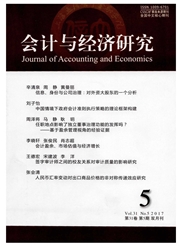

 中文摘要:
中文摘要:
本文立足于我国新兴资本市场中上市公司自愿接受中期财务报告审计这一独特的典型现象,借助于深圳证券市场的经验数据,以“审计需求动因”为理论基础,尝试通过构建经验模型,分析自愿接受中期财务报告审计的企业所具备的公司治理特征。本文采取Spearman描述性统计和Logit回归分析方法进行研究,研究发现资产负债率和资产收益率显著影响是否自愿接受中期财务报告的审计,独立董事比例、第一大股东持股比例及控股如否、管理层持股比例、两职合一以及股权制衡因素影响均不显著。
 英文摘要:
英文摘要:
Based on a classical phenomenon underlying Chinese developing capital markets, the paper constructs an empirical model related with the demand of auditing motivation to analyze characteristics of corporate governance in companies that voluntarily accept auditing of interim financial reporting. The paper adopts Spearman statistics analysis method and Logit regression model, and results of research state that the ratio of debt to assets and return on assets significantly influence the decision whether public listed companies voluntarily accept auditing of interim financial reporting, while factors of other corporate governance have little influence over the decision such as proportion of independent directors, stoekholding percentage of No. 1 shareholder, stockholding percentage of management, and restrictions among shareholders.
 同期刊论文项目
同期刊论文项目
 同项目期刊论文
同项目期刊论文
 期刊信息
期刊信息
